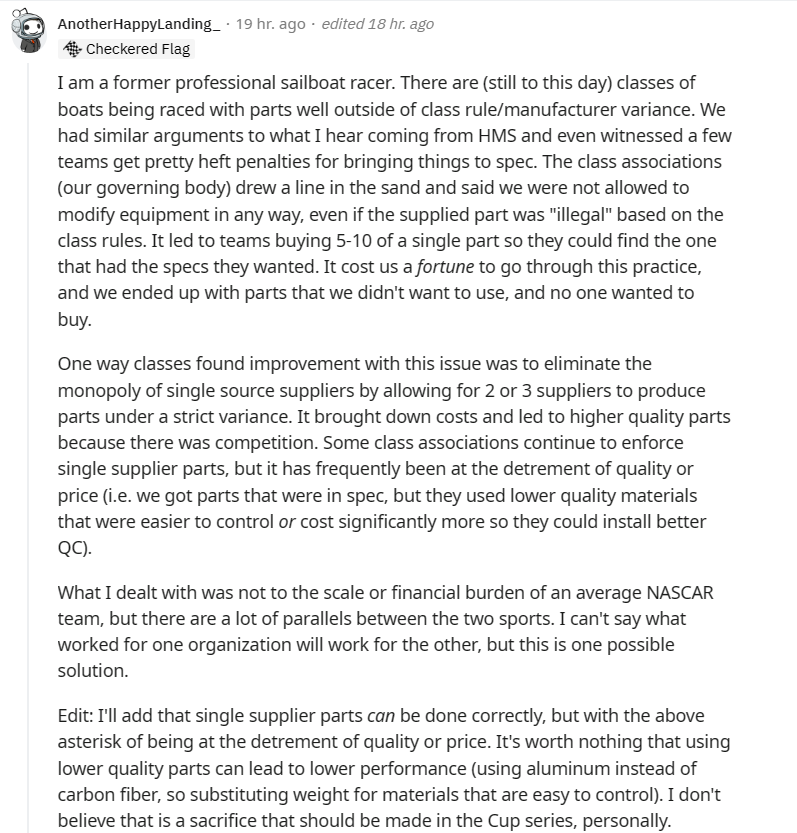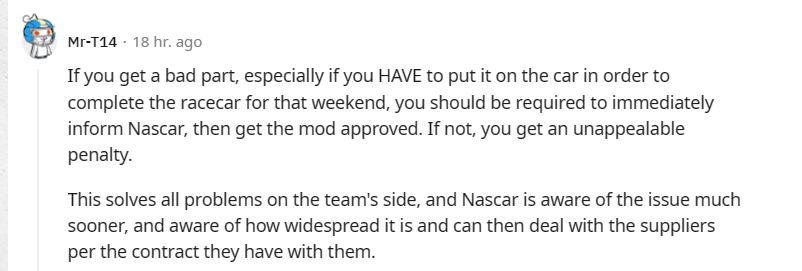
When Hendrick Motorsports was docked 100 driver and owner points and fined a grand total of $400,000 for “modifying” a single-source part in the hood louvers, it caught the attention of NASCAR fans. Obviously, if a team is cheating and creating an unfair advantage, that is not okay and it is NASCAR’s job as the governing body to step in and assign the appropriate penalties.
But after comments provided by Hendrick Motorsports VP, Chad Knaus, regarding the quality of the parts provided by a single-source supplier, the conversation shifted towards a place NASCAR would most likely prefer to shy away from. If Knaus was correct in his criticism that the parts they received were not worthy of racing by NASCAR’s own standards, shouldn’t the single-source supplier be held accountable for the “crappy ass parts?” Well, leave it to the NASCAR fans on Reddit to discuss this hot topic.
Reddit user, CMDR sparked the conversation. In his original post, he essentially begs the question as to what the repercussions should be for a single-source supplier who provides faulty parts to race teams that do not meet NASCAR’s own standards? Obviously, there can’t be any points penalties or monetary fines but surely there is something that can and should be done.
AnotherHappyLanding gave us his opinion on the matter. With a background in sailboat racing (which I admittedly know little about), he can relate to the teams, stating that something similar happened in his own sport.
The purpose of the NextGen car was to save teams money. It’s all about cost cutting these days with the reduction of practice and qualifying, testing ban, and, yes, the single source suppliers. NASCAR teams used to put together their own race cars. There was an art to it. A craft. That’s gone now. Now the teams are expected to purchase the cars essentially in a box and just assemble them once all the parts and pieces arrive at the shop. It’s essentially building a giant model airplane.
This commenter went through something similar as the governing body of his racing class mandated that only certain parts be used on the race boats. And these certain parts came from, you guessed it, a single-source supplier. The problem was, though, that sometimes these parts wouldn’t fit or there would be something off about them.
A measure that was meant to save the race teams money ended up costing even more as the teams would have to buy multiple versions of the same parts. Several of them were faulty and the problem with faulty parts is that nobody else wants to buy them, they couldn’t legally use them, and so they’d just have to sit around the shop collecting dust. This sparked the same kind of outrage amongst the boat racing teams as what we saw with Hendrick Motorsports and their appeal.
The big question in all of this is: How can we hold the single-source suppliers accountable?
AnotherHappyLanding breaks down what his governing body did. They broke up the big monopolies on the sport, creating a healthy competition between 2 to 3 suppliers which helped improve things immensely and cut down on costs.

JUMPINKITTENS thanks the writer for the insightful post. They agree that NASCAR should absolutely consider multiple suppliers for these parts.

Sullypants1 make the claim that the racing industry (or NASCAR industry, to be more specific) is the same as it ever was: overly expensive with the added downside of more laid off workers who were masters of their trade.

Sean says that NASCAR should try to sue the single-source supplier for damages, making the case that their inability to provide acceptable parts is harming their overall product.

Seems like an oxymoron, doesn’t it? Transparency and NASCAR? What a werid combo!

legacy057 is looking forward to getting more information following the Kaulig appeal which is scheduled to take place next week. I wouldn’t hold my breath.

Mr-T14 says the solution should be that teams have to communicate this issue with NASCAR as soon as the bad parts are received. If they do not, their appeal should be unappealable. Interesting take and one that is definitely worth a discussion.

In this instance, however, HMS did voice these concerns to NASCAR. NASCAR supposedly just sort of ignored it. They agreed to an voluntary inspection and the parts were confiscated BEFORE ever being run in an actual race.

What do you think the solution to this issue is? Should NASCAR bust up the monopolies which have a stranglehold on teams or is there another way? Let us know!
